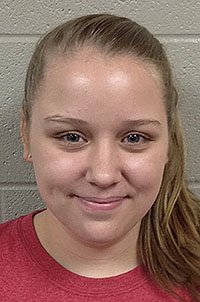A Northwest Arkansas teen's documentary about nuclear testing on the Marshall Islands earned her national recognition.
Rebekah Love, 17, finished third among 94 students from across the country who competed in the individual documentary category at the National History Day Contest this month. Love received a medal, a certificate and $250.
History behind History Day
The National History Day Contest was founded in 1974 at Case Western Reserve University in Cleveland. It was created to inspire students to conduct original historical research. The contest has grown to an international competition with more than 600,000 participants who start out at the regional level; fewer than 1 percent of their entries advance to the national finals level.
Source: Staff report
It was the best showing ever by a Northwest Arkansas student in the National History Day Contest, according to Jami Forrester, a Northwest Arkansas Community College professor who coordinated the regional History Day contest the past five years.
Love, a Farmington resident who will be a senior at Springdale High School this fall, worked for months on her documentary, "Marshall Islands: A Culture Damaged Through Scientific Exploration and Encounters with Western Civilization."
Her 10-minute piece won first place at the regional competition in March and first place at the state competition in April to qualify for the National History Day Contest.
Love started thinking about the project last summer and began working on it in September. She said she never knew much about her topic before that, though she goes to school with Marshallese students.
"It's a powerful topic, and one that's not talked about much," she said.
History Day is a competition for students in middle school and high school. There are five categories: documentaries, exhibits, papers, performances and websites. All categories have a junior and senior division. Each category, aside from papers, also has a group and an individual category.
This was the fourth year Love participated in History Day and the third time she's advanced to the national competition, each time in the individual documentary category. In previous years she did documentaries on the polio vaccine and Hattie Caraway, the first woman elected to the U.S. Senate.
Her latest work covers how the United States engaged in nuclear experiments in the Marshall Islands during the Cold War. The United States conducted 67 large-scale nuclear tests in the Marshall Islands between 1946 and 1958.
Much of the Marshallese population was displaced because of the testing. Many suffered both short-term and long-term health effects from the radiation to which they were exposed.
History Day documentaries must not exceed 10 minutes. Love initially had trouble grasping how she'd do justice to the story she wanted to tell in so little time.
"Once she really started researching it, it was overwhelming for her at first," said Brenda Love, Rebekah's mother and a media specialist at Springdale's Sonora Elementary School.
National History Day judges gave Love's work rave reviews, calling the emotional impact "very powerful" and praising her production ability and her use of interviews, according to a sheet judges provided.
Forrester, who attended the contest and advised local students on their projects, said the documentary Love submitted for the national event was "totally different" from her submission at the state level. Project revisions between the state and national contests are common.
"I knew when she sent me her final copy she had a very good chance to make it out of the first round (at nationals)," Forrester said.
This year also represented the best showing ever by Northwest Arkansas as a whole at the national contest, Forrester said.
Twenty-two students from Springdale, Prairie Grove and Rogers participated, representing 15 projects. Besides Love's project, three projects finished in the top 30 and three others finished in the top 40.
A project must finish in first or second place at the state contest to qualify for nationals.
In the documentary category, judges take into account many factors, including historical accuracy, use of primary sources, the flow of the piece and how well a piece incorporates the annual theme of History Day. This year's theme was "exploration, encounter, exchange."
It didn't hurt Love that her documentary was tied to a subject of relevance to her home region.
Between 8,000 and 12,000 Marshallese are estimated to live in Northwest Arkansas. It's the largest population of Marshallese in the continental United States. The Springdale School District last school year counted 2,481 students categorized as native Hawaiian or Pacific islander, most of which were Marshallese students.
Neisen Laukon, 62, of Springdale is a native of the Marshall Islands who lived on the Rongelop Atoll. She moved to the United States when she was 21, she said.
Laukon hasn't seen Love's documentary but said she appreciates her for spreading awareness of the nuclear testing.
The United States dropped the hydrogen bomb called Castle Bravo over the Bikini Atoll on March 1, 1954, just 100 miles away from Rongelap. It was the most powerful nuclear bomb the United States has ever detonated, as Love explains in her documentary.
Contaminated food and water made people sick. Laukon recalled people getting blisters on their feet from walking on the sand. Babies were born badly deformed.
Laukon has seen numerous family members get sick or die from cancer. Laukon herself has struggled with her health; she was sick for three years with infected lymph nodes and is having problems with her thyroid. She thinks her problems might be related to her exposure to radiation.
Laukon said for a long time she was embarrassed by what she and her fellow Marshallese went through, but she is not anymore. She has spoken about her experience at public events.
"I'm not ashamed now. I want people to know," she said.
NW News on 06/27/2016
